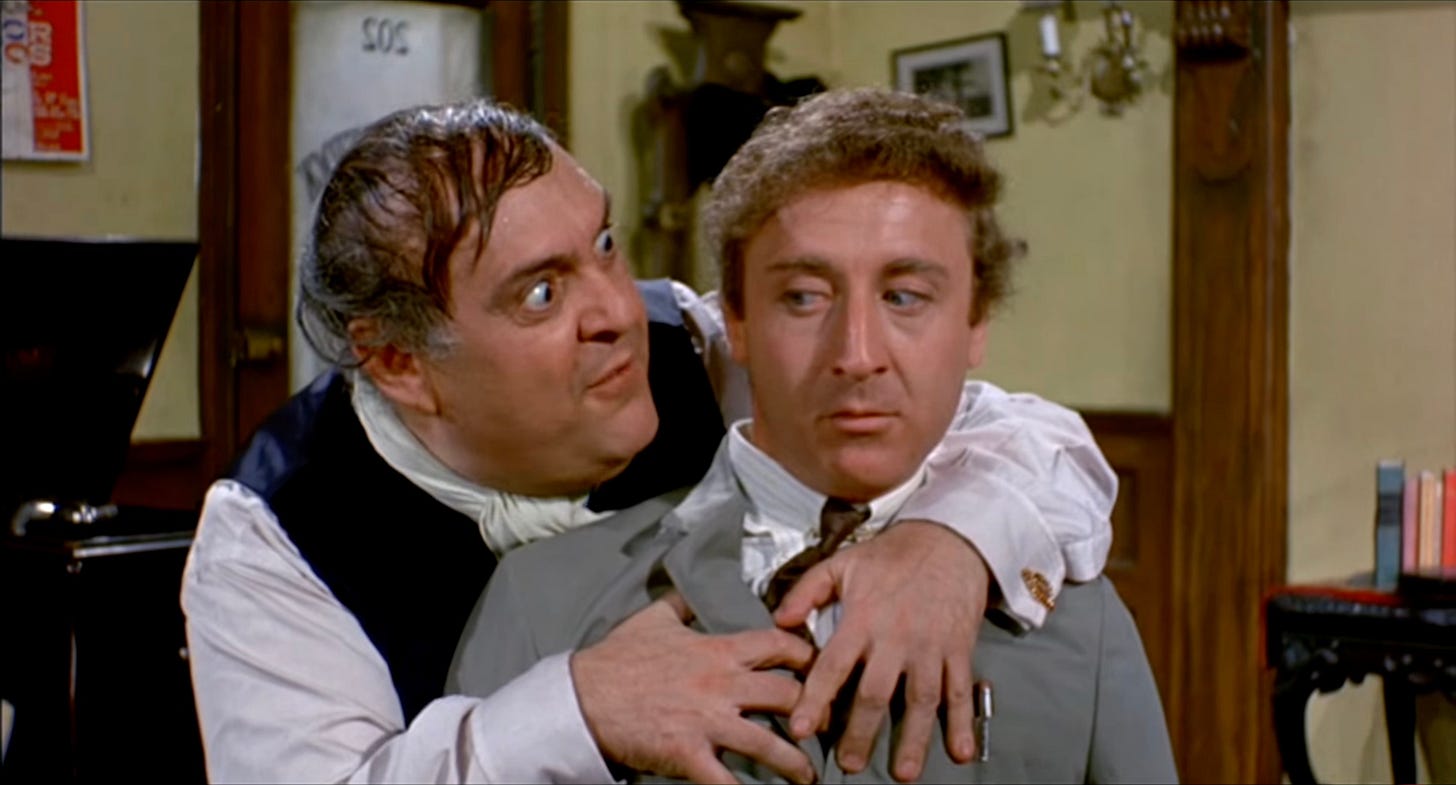It’s hard to make fun of someone you hate and still be funny.
There’s every reason to despise a historic monster like Adolf Hitler, who deserves mockery for all time. Still, contempt and comedy seldom go hand in hand. It’s too easy to end up pointing and laughing like the bully from The Simpsons. Such laughter is humorless.
But Mel Brooks nailed it in his 1967 directorial debut, The Producers, which holds up as an exceptional comedy because it’s about much more than making fun of Hitler.
I was fortunate enough to see the 2001 Broadway musical adaptation with the original cast, and I loved it. Both versions are wonderful, but the first is tighter and works better as a movie.
Max Bialystock (Zero Mostel) is a once-great Broadway producer who’s been reduced to wooing little old ladies for their money. When the spineless but clever accountant Leo Bloom (Gene Wilder) theorizes that it’s possible to make more money with a flop than with a hit, Max latches onto the idea. Max and Leo team up to produce the worst play imaginable, a show that by all rights should be a disaster: Springtime for Hitler.
Every principal character in the movie is a character. There is no straight man in Brooks’s script.
Max is a self-centered crook. Leo is a wimp who’s still attached to his childhood blanket. Franz Liebkind (Kenneth Mars) is a nutty Nazi who’s attached to his birds and his helmet. Roger De Bris (Christopher Hewett) is a flamboyant, cross-dressing director who knows so little about the world that a script called Springtime for Hitler raises no alarm bells. Ulla (Lee Meredith), a receptionist who knows some English, was not hired for her intellect.
It’s a cast full of wonderfully expressive faces and unhinged performances, precisely what the movie needs. No one freaks out quite like Gene Wilder.
As zany as it is, The Producers has a heart, and the heart is the friendship between Leo and Max. Max brings Leo out of his shell and teaches him to live a little while Leo discovers that Max actually does have some redeeming qualities.
In a PBS interview, Brooks said, “You know, I think my movies are really about, philosophically anyway, money or love. And every movie I make, I always have them decide that love is better.”
Viewed through that lens, mocking Hitler is merely a side benefit.
In that same interview, Brooks explained:
Well I’ll tell you the truth is I always believed that you could get even with a dictator by making people laugh at him rather than getting on a soapbox and trying to play vocal Ping-Pong and having a point of view about democracy versus totalitarianism. I said, “If you can just make people laugh at Mussolini, make them laugh at Hitler, make them laugh at all dictators, they—they would be defeated by laughter.”
Keep in mind that World War II was within living memory for many people when The Producers came out. Brooks himself is a veteran. Could people joke about such a horrific war when it was so recent?
Yes, because they weren’t making fun of the victims. They were making fun of the perpetrators. Revenge is a dish best served comedically.
This is where the movie outshines the musical. Max and Leo giddily anticipate their failure as the play opens with the song “Springtime for Hitler.” The camera keeps cutting back to the increasingly horrified audience.
The plan is working. But soon we learn that Max and Leo did a little too good a job of casting the worst actor to portray Hitler.
Dick Shawn plays the actor, appropriately named L.S.D. He’s a caricature of a brain-fried, overly stoned hippie, and at times he sounds like Robin Williams doing a bit. Yes, Springtime for Hitler features a hippie Hitler.
It’s brilliant. It skewers Nazis and hippies in one fell swoop (the Nazis more than the hippies, of course), even though the two groups are about as opposite as can be. A good contradiction enhances any comedy.
And because L.S.D. makes such a terrible Hitler, the audience believes they’re watching intentional satire. They have a grand time laughing at the hippie Hitler. Leo and Max fail at failing—another amusing contradiction.
In the 2001 musical, Max casts Franz as Hitler, but an injury forces Roger to step in at the last minute, resulting in an especially flamboyant führer—still zany, but a different sort of zaniness and one that Max and Leo are less directly responsible for. I prefer the movie’s approach, where Max’s confident decision—“That’s our Hitler!”—directly leads to the audience interpreting the play as satirical.
Brooks has devoted much of his career to cleverly spoofing familiar territory—in films such as Young Frankenstein, Spaceballs, and Robin Hood: Men in Tights—but The Producers may be his most original script. And in it, he shows us how to maintain our sense of humor in the face of evil.
Humor beats anger any day.




Mel Brooks is a fucking genius- I worship at his altar.
I also thought the Dick Shawn Character was also a bit of a veiled mockery of Bob Dylan after he went electric.